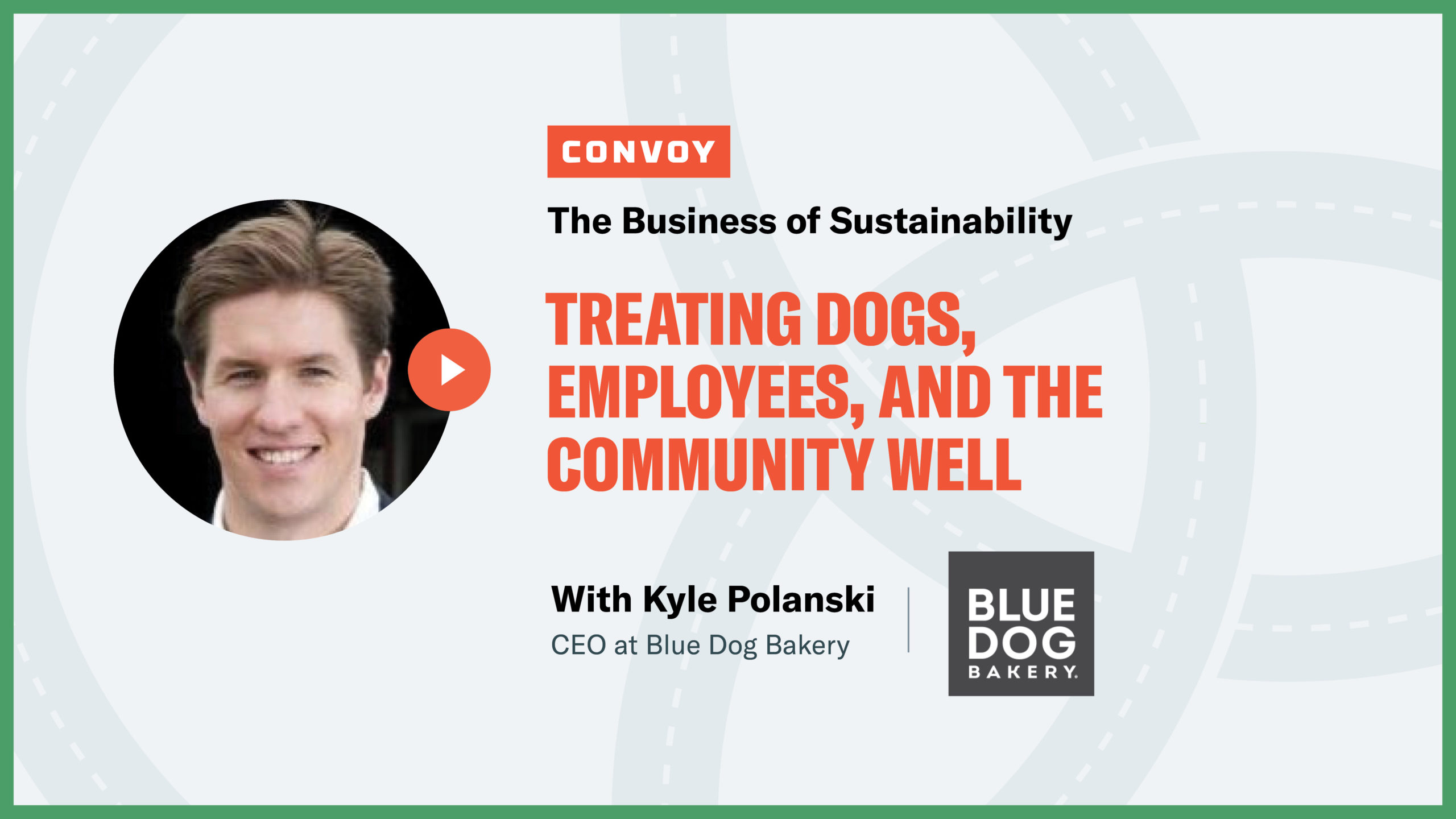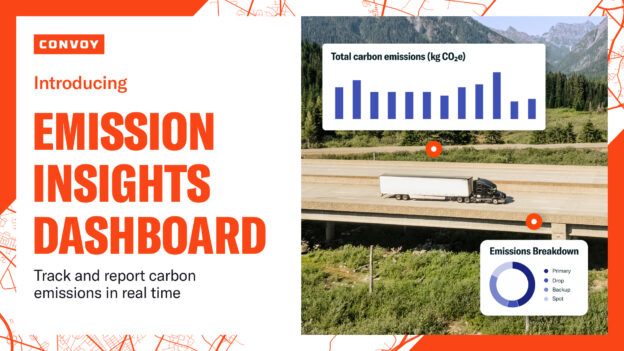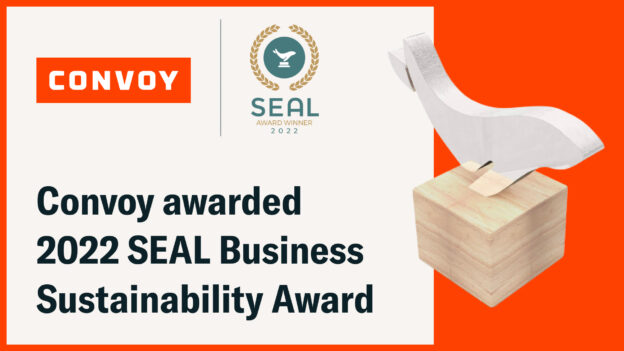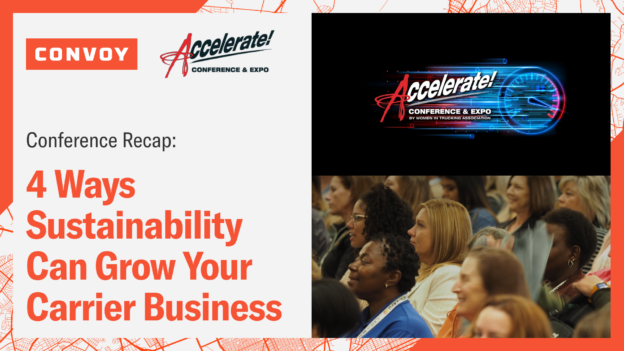Treating Dogs, Employees, And The Community Well With Blue Dog Bakery’s Kyle Polanski
Sustainability • Published on July 6, 2021
Every company in business today can have a positive impact on its customers, employees, environment, and the community at large. It is so important for CEOs to recognize that whether you run a Fortune 500 organization or a neighborhood bakery, the values of your business reflect on your brand.
Seeing sustainability and a commitment to social impact baked into a brand from the start is very inspiring, and it was a treat for me to speak with Kyle Polansky, CEO of Blue Dog Bakery. For anyone with a dog, Blue Dog Bakery is pretty well known for offering a variety of natural treats sold through some of the nation’s largest retailers.

Kyle walked me through how Blue Dog Bakery approaches everything from social impact to its commitment to non-profit support, employee health, product quality, environmental impact, and more.
- How Sustainability Is Integrated Into The Business Strategy: When the business started, the original vision was providing a healthy option for pet parents and their animals. We stand for all natural, no artificial colors, flavors, or ingredients. And it evolved from there. We’ve worked hard to both provide nutrition and health in the product but also support the broader dog community. We have a “never say no” policy to non-profits. We find a way to make a donation to any dog oriented non-profit that reaches out whether that be treats or ways to support events they’re having. And as the business evolves and as you grow, you find other areas and things to focus on. We have been really diligent about continuing to do that to hold up our end of the bargain on the support for sustainability and health of both the animals, their humans, and the broader pet community. (1:22)
- How Blue Dog Bakery’s Sustainability Commitments Continue To Evolve: As you get more into the detail of the product and as you build out your product portfolio, you recognize there are challenges you might face. With ingredients, for example, our product started out as a baked product, and we originally used vegetable oil or canola oil and we learned that palm oil actually has better shelf stability than canola oil. So, to make sure that product quality was maintained, we moved over to using palm oil, but as we did that and we researched our options, we recognized there were some sustainability issues around palm. There’s a lot of news you can read about palm oil causing issues with rainforest deforestation, particularly in Southeast Asia. This was exceedingly important to us and so we’ve gone out of our way for nearly 20 years now to source sustainable palm oil from producers that we believe are approaching the environment and their production in the right way. Over the last number of years, we’ve actually transitioned our baking facility and moved it so that we are closer to local wheat producers. In the baking world, one thing that is really interesting is that one of the most important factors in the quality of baked products is the freshness of the wheat that goes into that product. Today, we’re actually really productive. We actually have some of the freshest milled wheat in any baked product in America. Our wheat mill is less than a mile from our bakery facility and we get 4 to 6 truckloads of wheat every single day. So, when it goes into our baked products, it’s less than 48 hours milled. (2:43)
- Taking A Look At Sustainability Through The Entire Product Cycle: We’ve always had a really strong position on sourcing our materials — both our ingredients for the product and our packaging — from the United States. We think that’s an important stance for us to take and so we still do that today and that’s not always as easy or cost effective as you might hope it is, but we find ways to do it and we do it very competitively. We do things like make sure that the packaging on our products is recyclable so that people can feel good that when they go through a box of dog treats, one, it was produced with recycled material and two, it is recyclable. We try to look at every facet of the business and see how we can do a better job to make sure that we are socially responsible and to ensure we’re listening to the interest of our consumers, too. Some of these things come through the pet parents that are buying our products saying, ‘Hey, have you thought about this?’ And so, we try to dive in and do a good job. (5:00)
- Determining What To Focus On First: We start first and foremost with the product and what goes into the product and delivering the best product to the consumers and their animals. That allows us to exist. But after that, we really think about it as they come to us. One thing I haven’t mentioned so far is sustainability from a business culture and employee perspective. We really try to support the people here and make this a good positive working environment for them and address the things that are important to keeping them healthy. We have always paid for 100% of healthcare for our employees. We help support retirement plans for our employees. Almost 10 years ago we instituted a healthy lifestyle benefit here at Blue Dog, so if you want to get a new bike or new running shoes or join a gym, we’ll reimburse a meaningful portion of that for you because we recognize that your ability to come here and do a great job is contingent on you being healthy and happy holistically. So that’s one step past the product and things that you think about as maybe typical business sustainability practices. We take them on as we see them and try to continue to make progress. (6:19)
- How Blue Dog Bakery Looks At The Future Of Sustainability At The Company: We don’t set hard lines and look out and say, we want to accomplish this or that. We generally hold ourselves to a non-GMO ingredient list. And that’s really hard to do so that was something that we’ve maintained for a really long time and as you expand your product portfolio and as you grow, it can be harder and harder to do that. There is a cost associated with that and you have to be really resourceful to go chase the solutions down. Do we have big long-term goals that we set up and say, hey, we’re working toward this? Maybe not. But we try to set very high standards and hold ourselves to them as we make progress. As life evolves and business evolves and you have success, that becomes harder and harder to do. So, I think really holding dear to those core values that we started with — healthier options for pet parents and their animals and doing it in the most sustainable, world healthy way — is what keeps us pushing the envelope. (8:38)
- What Value Investing In Sustainability Brings To Blue Dog Bakery: Consumers will tell you what they want and what’s important to them, but when they get in the shopping environment, the bottom line is that price matters. So, you have to walk a very careful path on delivering the quality or value standards they expect, but also delivering a product that’s not outrageously expensive. We’re not the cheapest option out there. But by communicating the standards and values to our shoppers and the people that love our brand, the fact that those are their values too, that’s why they like us and buy the product, it allows us to have that modest premium in pricing so we can afford to do these things. (10:35)
- What Consumers Should Know About Blue Dog Bakery: They should know that we’re committed to the health and wellbeing of their animal. That’s first and foremost to us and also that our brand and our products are really there for them to have a better, more positive experience with their dogs. That’s what it’s all about. Dog treats are all about fun and reward and health is how we deliver that. But that’s really the takeaway is sustainability is at the forefront for us. Product quality and all of that leads to quality time with their animals and a better relationship and more fun with their animals. That’s really it. (12:14)
TRANSCRIPTION
Jennifer: Tell me about the founding story of Blue Dog Bakery and how you became CEO.
Kyle: Yeah, it’s a pretty fun story and pretty Seattle story, frankly. My business partner, Margot Kenly, started the business on her houseboat which is just a few blocks from our current office here, what, 23 years ago now. And I joined her a little over 12 years ago to help her lead the business, you know, it has turned out to be a wonderful ride and a lot of fun and we’ve had a lot of success.
Jennifer: I’ve been all over your website and it’s so clear that community and social impact is really important to your business. Can you share more about how sustainability is integrated into your business strategy?
Kyle: Absolutely. I think, you know, when the business started, Margot’s original vision was providing a healthy option for pet parents and their animals. And I think that’s a great foundational pillar to begin with. You know, so we stand for all natural, no artificial colors, flavors, or ingredients. And it really went from there. You know, since the business started, we’ve worked hard to both provide nutrition and health in the product but also support the broader dog community. So, we have a never say no policy to non-profits. [2:00] So, any dog-oriented dog non-profit that reaches out, we find a way to make a donation whether that be treats or ways to support events that they’re having. And, you know, we’ve been doing that for over 20 years now. So, I mean, those are some of the things that we started out with and as the business evolves and as you grow, you find other areas and things to focus on. I think we’ve been, you know, really diligent about continuing to do that to hold up our end of the bargain on the support for sustainability and health of both the animals, their humans, and the broader pet community.
Jennifer: Awesome. Well, what are some of those newer things that you’ve been focused on as you’ve evolved sustainability over the years?
Kyle: One of them is as you get more into the detail of the product and as you build out your product portfolio, you recognize that there are challenges that you might face. With ingredients, for example, we have used, you know, our product started out as a baked product, and we originally used vegetable oil or canola oil and we learned that palm oil actually has better shelf stability than canola oil. So, to make sure that product quality was maintained, we moved over to using palm oil but as we did that and we researched our options, we recognized that there were some sustainability issues around palm. There’s a lot of media and a lot of news you can read about, about palm oil causing issues with rainforest deforestation, particularly in Southeast Asia. And that was exceedingly important to us and so we’ve gone out of our way for nearly 20 years now to source sustainable palm oil from producers that we believe are approaching the environment and their production in the right way. So that’s one very good, detailed ingredient example. Over the last number of years, we’ve actually transitioned our baking facility. We’ve moved it so that we [4:00] are closer to local wheat producers. I mean, as you, the baking world, one thing that is really interesting is that one of the most important factors in the quality of baked products is the freshness of the wheat that goes into that product.
Today, we’re actually really productive. We actually have some of the freshest milled wheat in any baked product in America. Our wheat mill is less than a mile from our bakery facility and we get 4 to 6 truckloads of wheat every single day. So, when it goes into our baked products, it’s less than 48 hours milled.
That’s just really neat stuff. So, you’re supporting, you know, the local agricultural community to make sure that you’re bringing ingredients and supply components from the area, you’re working on the quality of the product that you’re delivering to the consumer, or in this case, the dog. So that’s really neat. And then we do other things, you know, we’ve always had a really strong position on sourcing our materials, both our ingredients for the product and our packaging from the United States. We think that’s an important stance for us to take and so we still do that today and that’s not always as easy or cost effective as you might hope it is, but we find ways to do it and we do it very competitively. And then we do things like make sure that the packaging on our products is recyclable so that you people can feel good that when they go through a box of dog treats, one, it was produced with recycled material and two, it is recyclable. So, we try to look at every facet of the business and say what can we do to, you know, do a better job. To make sure that we are socially responsible and to make sure, you know, that we’re listening to the interest of our consumers too. Some of these things come through, you know, the pet parents that are buying our products saying, ‘Hey, have you thought about this?’ And so, we try to dive in and do a good job.
Jennifer: How do you determine what to focus on first, especially when they’re all great areas to make progress against?
Kyle: I think it starts first and foremost with the product and what goes into the product and delivering the best product to the consumers and their animals. So, we certainly start there. That allows us to exist. But after that, we really think about it as they come to us. I mean, one thing that I haven’t mentioned so far is sustainability form sort of a business culture and employee perspective. We really try to support the people here and make this a good positive working environment for them and address the things that are important to keeping them healthy. So, it’s a little bit more esoteric in terms of business sustainability. But, you know, we’ve always paid for 100% of healthcare for our employees. We help support retirement plans for our employees. We have a…I remember learning from a family member of mine that at their job, they received a healthy lifestyle benefit just to keep them healthier and happier and they got reimbursed for things like buying a standup paddle board, or something like that and I thought that was really cool. So, you know, almost 10 years ago now we instituted a healthy lifestyle benefit here at Blue Dogs so if you want to get a new bike or you want to get new running shoes or you want to join a gym so you can go to a spin class or something, you know, we’ll reimburse a meaningful portion of that for you because, you know, we recognize that your ability to come here and do a great job is contingent on you being healthy and happy just, you know, holistically. So that’s, you know, one step past the product and sort of things that you think about as maybe typical business sustainability practices [8:00] but, you know, those are the sorts of things we do. So, we sort of take them on as we see them and try to always just continue to make progress.
Jennifer: Do you have sustainability goals that you’re focused on today or how do you think about future looking sustainability efforts?
Kyle: We don’t set hardlines and look out and say, hey, we want to accomplish this. But I’ll pick another example. We generally hold ourselves to a non-GMO ingredient list. And that’s really hard to do so that was something that we’ve maintained for a really long time and as you expand your product portfolio and as you grow, it can be harder and harder to do that. You know, there is a cost associated with that and you have to be really resourceful to go chase the solutions down. And so, that’s an interesting question, do we have, you know, big long-term goals that we set up and say, hey, we’re working towards this…you know, I guess, maybe not. But we try to set very high standards and hold ourselves to them as we make progress. And, you know, as things get…as life evolves and business evolves and you have success, that becomes harder and harder to do. So, I think really holding dear to those, you know, core values that we started with is, you know, healthier options for pet parents and their animals and doing it is sort of the most sustainable, you know, world healthy way that we kind is what keeps us sort of pushing the envelope if you will.
Jennifer: I love that you’ve incorporated sustainability into your values [10:00] and culture as a way to keep it a priority for your business. One thing that you’ve mentioned a couple of times is that there have been some cost implications whether you’re trying to find non-GMO ingredients or better packaging produced here in the United States. What value are you seeing in terms of investing in sustainability in this way? What values is it bringing to your business?
Kyle: It’s hard because consumers often will tell you if you ask them. But that’s really, really important to them. But when they get in the shopping environment, price matters. So, you have to walk a very careful path on, you know, delivering the quality or value standards that they expect, but also delivering a product that’s not outrageously expensive because you’ve had to, you know, get over these hurdles to meet their standard. So, I think by communicating the standards and values to our shoppers and the people that love our brand, we’re not the cheapest option out there. I mean, if you go look at the traditional, national brands that are broadly available, they are a little bit more expensive but our promise to the consumer is only a little bit more. And I think, you know, the fact that those are their values too, that’s why they like us and buy the product, allows us to have that modest premium in pricing so that we can afford to do that stuff.
Jennifer: As someone [12:00] who is picking up their next Blue Dog Bakery product, what should they know about sustainability for you and the company?
Kyle: They should know that we’re committed to the health and wellbeing of their animal. I mean, that’s first and foremost to us and also that, you know, our brand and our products are really there for them to have a better, more positive experience with their dogs. I mean, that’s what it’s all about. Dog treats are all about fun and rewarding and, you know, health is how we deliver that. But that’s really the takeaway is sustainability is at the forefront for us. Product quality and all of that leads to quality time with their animals and a better relationship and more fun with their animals. That’s really it.



